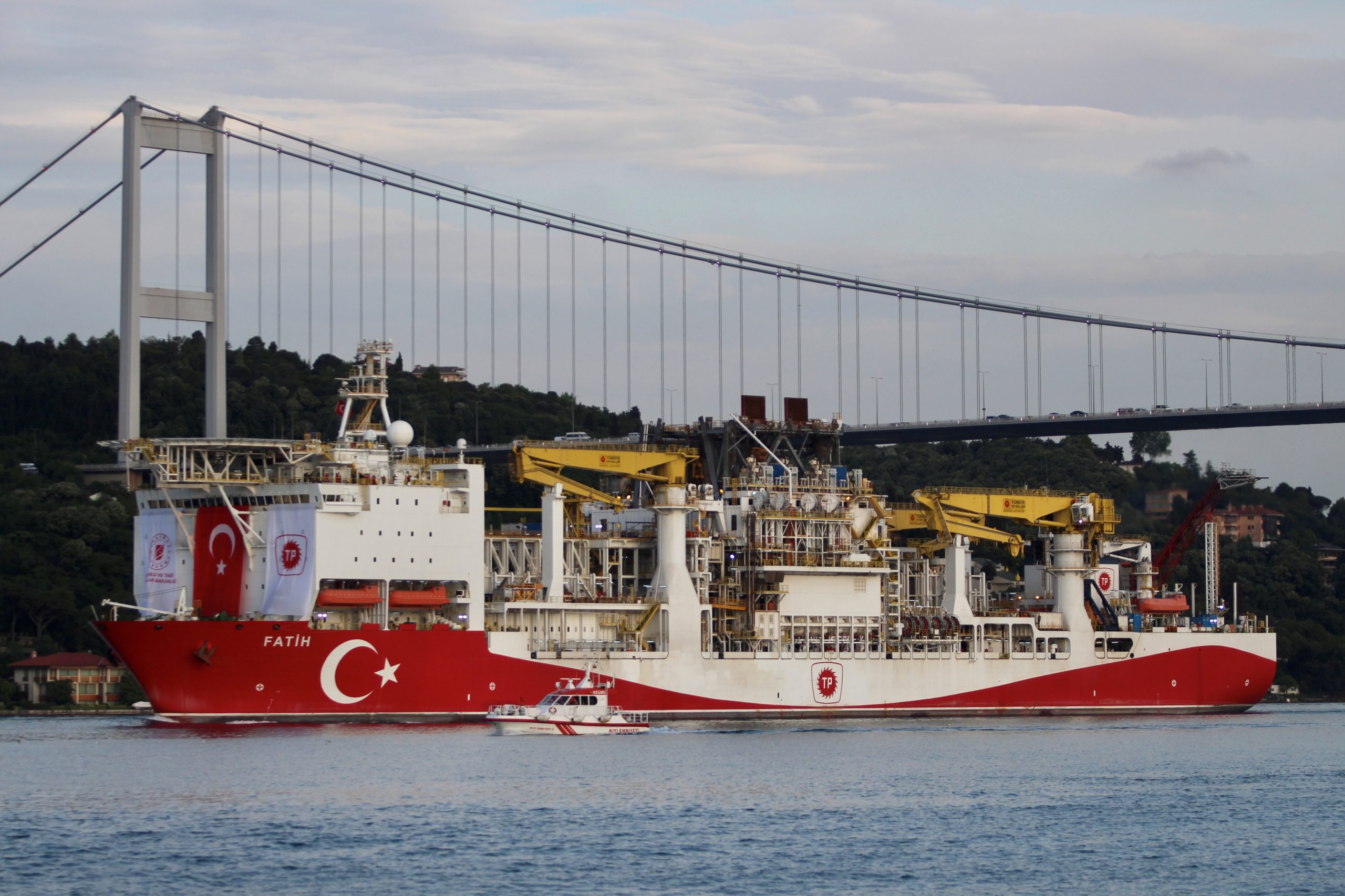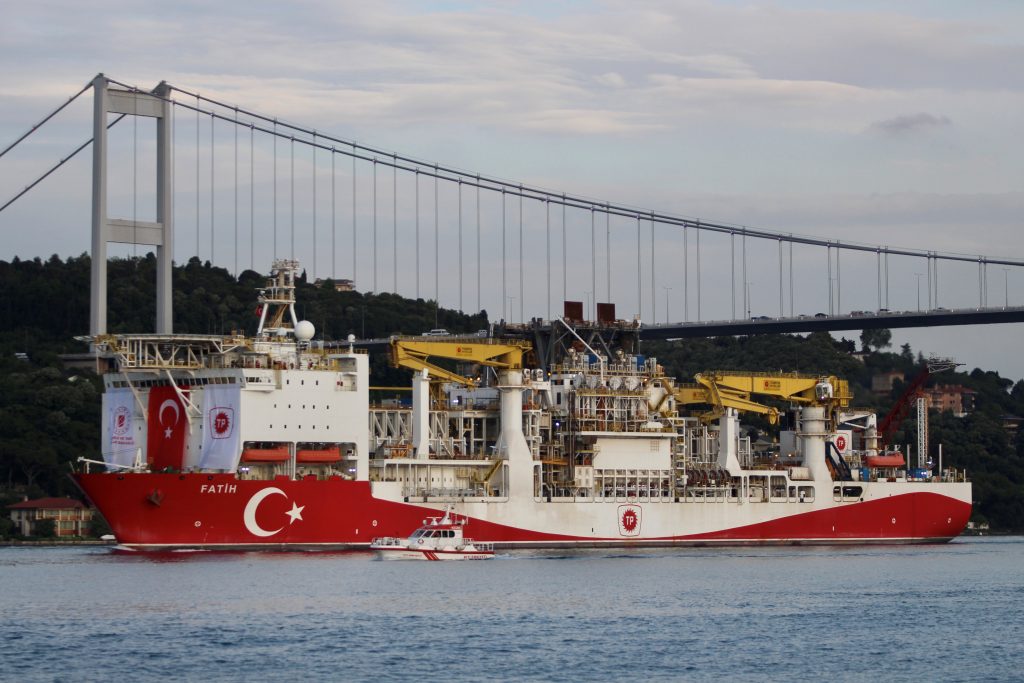Turkey can become an energy hub—but not by going all-in on Russian gas
In mid-October, Turkish Foreign Minister Mevlüt Çavuşoğlu said Turkey had the capacity to become an energy hub for natural gas headed to Europe. Though the idea is not new, this time it came as a reply to Russian President Vladimir Putin’s offer to redirect Russian gas supplies intended for the European Union (EU) from the damaged Nord Stream pipelines to the Black Sea and further to Europe via Turkey.
In a recent interview, Turkish Energy Minister Fatih Dönmez doubled down on Ankara’s ambition, stating that it would “lay out a road map by the end of this year” when it “may hold a conference for suppliers and buyers.”
Turkey’s desire to play a major role in regional energy infrastructure is not only geopolitically driven but also economically and technically feasible. The country’s location at the intersection of multiple hydrocarbon pipelines as well as its gas storage capacity can indeed help it shape the energy landscape for the region. However, for it to suceeed as an energy hub, Russian gas can’t be a key part of the plan.
The core philosophy of any “energy hub” is based on several pillars: diversification of existing routes and suppliers, independence in decisionmaking through an independent institution, market demand and supply that determine prices, and political will of potential partners to get involved in the projects. The Russian proposal ticks none of these boxes.
On the contrary, Putin’s idea of making Turkey a Russian gas hub could increase Ankara’s reliance on Russian fossil fuels, deepen its strategic dependence on Moscow in areas far from energy, and further damage Turkey’s already complex relations with the West.
Cheap gas at a high political cost
Turkey has made progress in reducing its gas purchases from Russia in recent years, due to the increased share of liquified natural gas (LNG) imports, as well as diversifying its energy mix by incorporating more renewables. However, it still remains heavily dependent on Russian energy supplies: Gazprom provided 44.9 percent of Turkish domestic gas demand in 2021. Turkey also imports between 10 percent and a third of its crude oil from Russia each year. Turkish imports of Russian oil have grown significantly since the February invasion of Ukraine, doubling in August. According to a new report by the Ukrainian Black Sea Institute for Strategic Studies, Turkey became the leading Russian crude oil importer in October, followed by Italy and Greece.
Meanwhile, Rosatom is building the Akkuyu nuclear power plant on a build-own-operate model in the Mediterranean province of Mersin. There are reasonable fears that this strategic facility—which is constructed and owned by the Russian state enterprise, will be run by Russian operators in a NATO-member country, and is located close to Turkey’s Incirlik Air Base and the Russian military build-up in Tartus, Syria—may become the next bargaining chip in Moscow’s nuclear blackmail. At the same time, talks on a possible new deal to build a four-reactor plant in Sinop on the Black Sea coast, just across from Ukraine’s Russian-occupied Crimean peninsula are also raising eyebrows.
Experts are warning that this mounting dependence on Russian oil, nuclear technologies, and gas leaves Turkey vulnerable to energy blackmail of the kind Europe has experienced through Russian gas cuts.
In fact, Turkey is familiar with Moscow weaponizing gas. By building TurkStream—a gas pipeline that connects Russia to Turkey, bypassing Ukraine—as a geopolitical rather than an economic project, Gazprom deepened Ankara’s reliance on Moscow and caused tensions in Turkey’s relations with Ukraine.
Earlier this year, Russia declared a ten-day maintenance shutdown of the Blue Stream pipeline, which carries around 60 percent of Turkey’s Russian gas imports, with just a two-day notice. Experts say that occasional maintenance shutdowns of TurkStream, which delivers the rest of the Russian gas to Turkey, as well as Putin’s unjustified allegations about expected terror acts on the TurkStream pipeline, may signal trying times for Ankara ahead of this winter, and parliamentary and presidential elections planned for 2023.
Finally, growing energy collaboration between Turkey and Russia exposes Ankara to more pressure from the EU and United States over increasing concerns that Russia could use this collaboration to circumvent sanctions. Just a week after Turkish President Recep Tayyip Erdogan and Putin discussed the “energy hub” idea and Turkey’s Treasury and Finance Minister Nureddin Nebati reiterated his request for a discount on Russian gas and deferral of payments for its supplies, a US Treasury delegation led by Elizabeth Rosenberg, assistant secretary for terrorist financing and financial crimes, visited Turkey. According to the US Treasury, the topics covered during the meetings with her counterparts in the Turkish government as well as the business community included “the sanctions and export controls imposed on Russia… energy security, anti-money laundering policy, and countering the financing of terrorism.”
Can Turkey become a Russian gas hub?
There are also technical questions, which make realization of the deal with Russia problematic. Despite the promising rhetoric of both country’s leaders, it is difficult for Turkey to import much more Russian gas.
Firstly, the existing capacity of BlueStream—16 billion cubic meters (bcm)—is used to pump gas to cover Turkey’s own domestic demands. Another gas pipeline connecting Turkey to Russia, TurkStream, has a total capacity of 31.5 bcm. The first line, with a capacity of 15.75 bcm, is designated for supplies to Turkey’s domestic customers, while the second line, with the same capacity, carries Russian gas further to Europe through Bulgaria.
These capacities cannot come close to replacing the 110 bcm of the two Nord Streams. Besides, this route can—even in theory—only feed the small Southern European market of Greece, North Macedonia, Serbia, and Hungary, whereas the major consumers of Russian gas, such as Germany, remain in the north.
Secondly, construction of new pipelines in the Black Sea, currently a war zone, demands physical safety and security, significant investments, advanced deep-water offshore construction technologies, and pipelaying vessels—all potential targets for new EU sanctions. Russia can’t guarantee the security of such projects, and Western companies will be reluctant to provide investments, technology, and insurance. Another big question: How does one bring additional volumes of gas from the deposits to the Russian Black Sea coast?
Thirdly, the EU, which is now undergoing a major decarbonization transition and is disillusioned with Moscow as a credible partner, has little appetite for more Russian gas, whoever the seller might be. Since the beginning of the Russian war on Ukraine, the EU has reduced Russia’s share of its gas imports to 7.5 percent from 43.5 percent in 2021, according to European Commission President Ursula von der Leyen. During her July visit to Baku where she signed a deal to double gas imports from Azerbaijan, she noted that “the European Union has decided to diversify away from Russia and to turn toward more reliable, trustworthy partners.” There is little likelihood that any new pipeline carrying Russian gas to EU borders will get a green light from Brussels. Instead, it would be doomed to the fate of the South Stream pipeline, which was to transport gas from Russia to several European nations via Bulgaria but had to be canceled following EU objections.
Can Turkey still become an energy hub without Russia?
Turkey can still take on the role of a major energy player in the region and offer Europe alternative fossil fuels to fill the Russian gas gap.
However, for that, Ankara will have to make a political decision to decouple itself from Moscow and turn to alternative suppliers. Turkey could look to enhance capacities of the Trans-Anatolian Natural Gas Pipeline (TANAP) and Southern Gas Corridor to pump in more Azerbaijani and, potentially, Turkmen gas. The current transmission capacity of TANAP is 16 bcm, with 10 bcm allocated for Europe and 6 bcm staying for Turkey’s domestic market. A recent deal signed between the European Commission and Azerbaijan will allow this number to double to 32-33 bcm in the next five years. If Turkmenistan steps in to join the project, further diversification of gas supplies will benefit both Turkey’s own energy security and its relations with Europe, decreasing countries’ dependence on Russia. The upcoming Turkey-Azerbaijan-Turkmenistan summit in Awaza may bring new positive developments in this direction.
Besides, Turkey could tap into Eastern Mediterranean gas resources by accelerating efforts to reach a deal with Israel; revive the idea of a Trans-Balkan corridor with Ukraine; explore opportunities to bring Kurdish gas from Northern Iraq; and increase cooperation on LNG with the United States, Qatar, and Algeria. These would diversify its energy supplies, bolster Turkey’s position against Russia and help mend ties with the West. Despite the legal, political, and technical challenges—which accompany any such project—these options might be well worth trying.
The exploration of Turkey’s own Sakarya gas field in the Black Sea can potentially supply up to 25 percent of domestic demand after it becomes operational in 2023, with an estimated ten million cubic meters per day. Finally, developing national energy infrastructure—from building new LNG terminals and regasification facilities to further enhancing underground gas storage capacities—will significantly bolster Turkey’s own energy security and its stance vis-à-vis an increasingly unpredictable Russia.
To achieve these targets, Turkey will need to obtain capital investments from international financial institutions, technical assistance from Western companies, and political support from NATO and the EU. The European sanctions for increased cooperation with Russia are unlikely to work if not complemented with viable and attractive alternatives. The economic and political benefits of being part of the European energy market should be made clear to Turkey by its Western partners. Keeping Ankara engaged within the EU’s regional energy projects and providing investment opportunities for developing its energy infrastructure, based on clear conditionality, could make Russia’s “hub” proposals less attractive.
On its part, Turkey should wake up to the new realities. Both commercial logic and political wisdom dictate that Europe will no longer be a major market for Russian gas. Exploring phantom opportunities of energy cooperation with Russia at the expense of real risks of getting exposed to US and EU sanctions will not transform Turkey into an energy hub. Quite the opposite, it would spell the end of this dream.
Yevgeniya Gaber is a nonresident senior fellow at the Atlantic Council IN TURKEY and at the Center in Modern Turkish Studies, Carleton University. She was previously a foreign-policy adviser to the prime minister of Ukraine. Follow her on Twitter @GaberYevgeniya.
Further reading
Image: Turkey’s drilling vessel Fatih sails in the Bosphorus, on its way to the Black Sea in Istanbul, Turkey May 29, 2020. Picture taken May 29, 2020. REUTERS/Yoruk Isik




